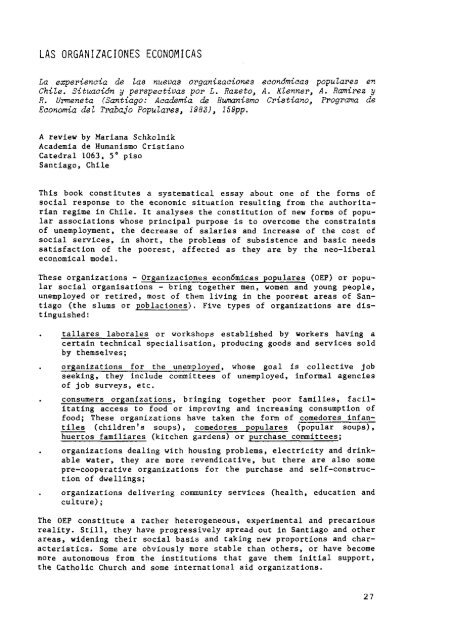Ifda dossier 47, May/June 1985
Ifda dossier 47, May/June 1985
Ifda dossier 47, May/June 1985
You also want an ePaper? Increase the reach of your titles
YUMPU automatically turns print PDFs into web optimized ePapers that Google loves.
LAS ORGANIZACIONES ECONOMICAS<br />
La experiencia de las nuevas orgmizaciones econdmicas populates en<br />
Chile. Situaciihi y perspecti-vas por L. Razeto, A. Klenner, A. Rmirez y<br />
R. Urmeneta (Santiago: Academia de Humanismo Cristiano, Progrma de<br />
Economia del Traba jo Populares, 1983), 159pp.<br />
A review by Mariana Schkolnik<br />
Academia de Humanismo Cristiano<br />
Catedral 1063, 5' piso<br />
Santiago, Chile<br />
This book constitutes a systematical essay about one of the forms of<br />
social response to the economic situation resulting from the authorita-<br />
rian regime in Chile. It analyses the constitution of new forms of popu-<br />
lar associations whose principal purpose is to overcome the constraints<br />
of unemployment, the decrease of salaries and increase of the cost of<br />
social services, in short, the problems of subsistence and basic needs<br />
satisfaction of the poorest, affected as they are by the neo-liberal<br />
economical model.<br />
These organizations - Organizaciones econ6micas populares (OEP) or popu-<br />
lar social organisations - bring together men, women and young people,<br />
unemployed or retired, most of them living in the poorest areas of San-<br />
tiago (the slums or poblaciones). Five types of organizations are dis-<br />
tinguished:<br />
. tallares laborales or workshops established by workers having a<br />
certain technical specialisation, producing goods and services sold<br />
by themselves;<br />
organizations for the unemployed, whose goal is collective job<br />
seeking, they include committees of unemployed, informal agencies<br />
of job surveys, etc.<br />
. consumers organizations, bringing together poor families, facil-<br />
itating access to food or improving and increasing consumption of<br />
food; These organizations have taken the form of comedores infan-<br />
tiles (children' S soups), comedores populares (popular soups),<br />
huertos familiares (kitchen gardens) or purchase committees;<br />
. organizations dealing with housing problems, electricity and drink-<br />
able water, they are more revendicative, but there are also some<br />
pre-cooperative organizations for the purchase and self-construc-<br />
tion of dwellings;<br />
. organizations delivering community services (health, education and<br />
culture) ;<br />
The OEP constitute a rather heterogeneous, experimental and precarious<br />
reality. Still, they have progressively spread out in Santiago and other<br />
areas, widening their social basis and taking new proportions and char-<br />
acteristics. Some are obviously more stable than others, or have become<br />
more autonomous from the institutions that gave them initial support,<br />
the Catholic Church and some international aid organizations.
















